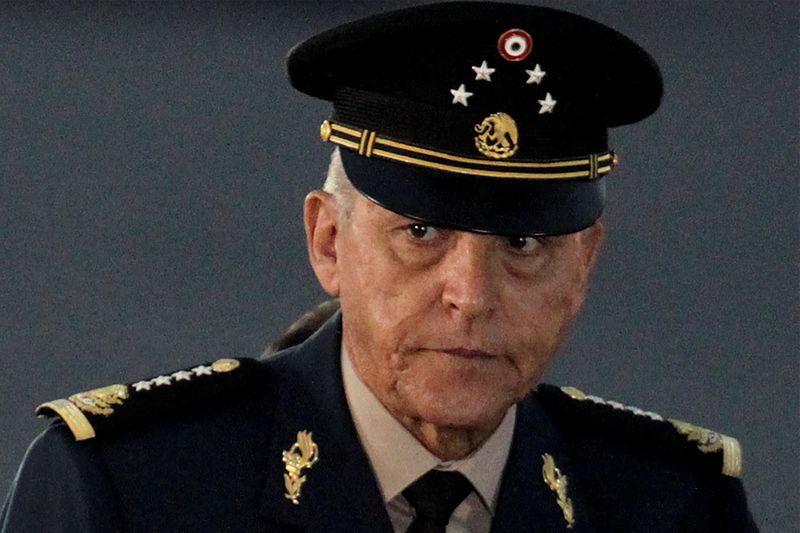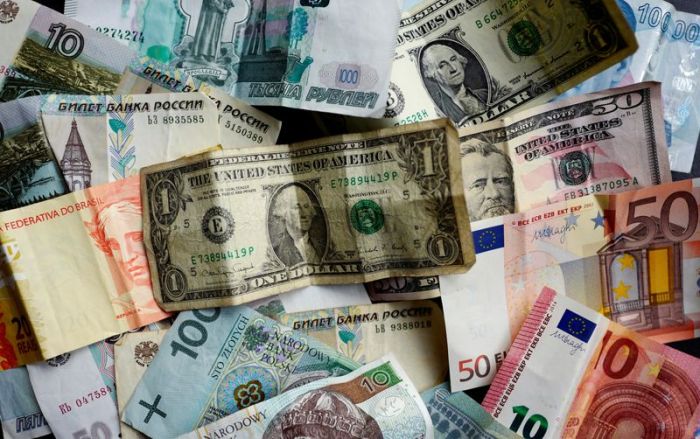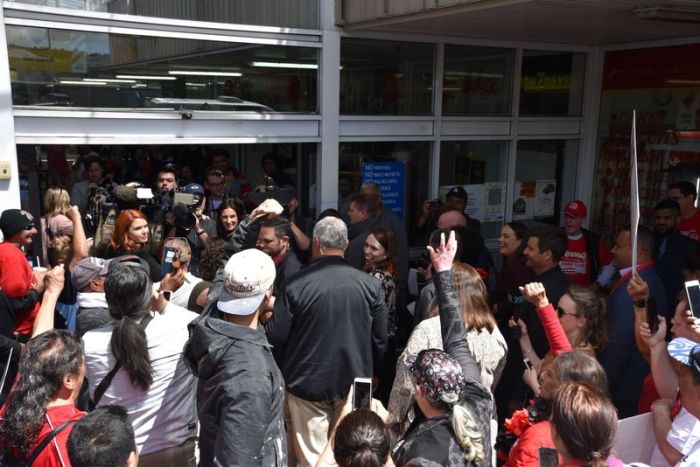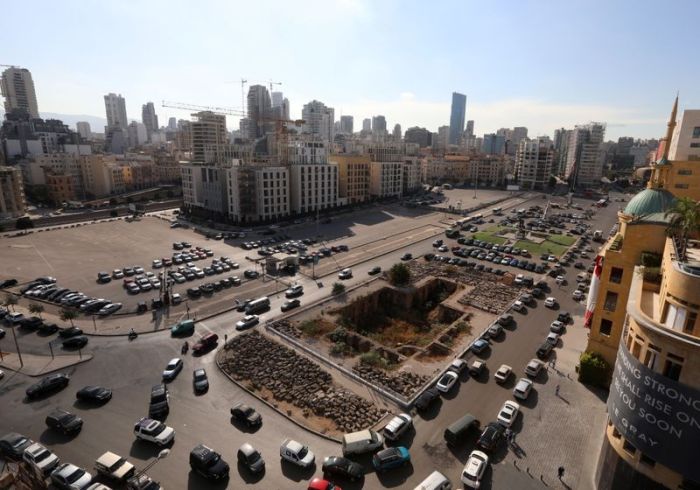MEXICO CITY (Reuters) – Mexico’s former defense minister Salvador Cienfuegos used his power in office to protect a faction of the Beltran-Leyva cartel, directing operations against rival gangs and even finding maritime transport to ship drugs, U.S. prosecutors said on Friday.
Cienfuegos, arrested at Los Angeles airport on Thursday, took bribes in return for protection that included warning cartel members about U.S. investigations, according to prosecutors in New York who have charged the 72-year-old with four counts of drug trafficking and money laundering.
“In exchange for bribe payments, he permitted the H-2 Cartel – a cartel that routinely engaged in wholesale violence, including torture and murder – to operate with impunity in Mexico,” prosecutors said in a court filing.
The H-2 Cartel is a name for a remnant of the Beltran-Leyva gang.
Cienfuegos served from 2012 to 2018 in the government of President Enrique Pena Nieto, several of whose aides and party members are now accused of high level corruption. Pena Nieto has denied allegations he took a cartel bribe.
The detention comes less than three weeks before the U.S. presidential election. President Donald Trump, seeking a second term, has made clamping down on drug cartels a priority, though without major progress since he took office in 2017.
The arrest of Cienfuegos – nicknamed El Padrino, or The Godfather, in an August 2019 indictment that was sealed until he was in U.S. custody – marked the first time a former Mexican defense minister has been indicted and detained.
Awarded a Pentagon honor for excellence just two years ago, his criminal activities, if proven, are another sign of flaws in the U.S.-backed war on drug cartels. Mexico has suffered hundreds of thousands of deaths and disappearances in cartel violence this century.
Cienfuegos’ downfall has far reaching implications for Mexico’s anti-cartel strategy, led largely by the armed forces for more than a decade.
Ahead of mid-term elections next year, President Andres Manuel Lopez Obrador will seek to capitalize on the capture of such a high-ranking member of his predecessor’s government.
Lopez Obrador pledged to suspend anyone inside his government implicated in the charges, but needing to avoid instability, he stepped carefully.
“We won’t cover up for anybody,” he said, before voicing support for Cienfuegos’ successor at the head of the army and his counterpart in the navy, noting he had personally vetted them and vouched for their honesty.
Lopez Obrador incorporated the arrest into his narrative that his predecessors presided over a debilitating increase in corruption in Mexico, for years convulsed by horrific levels of drug gang violence.
“If we’re not talking about a narco state, one can certainly talk about a narco government, and without doubt, about a government of mafiosi,” Lopez Obrador said.
“We’re cleaning up, purifying public life.”
There had been no open probe in Mexico of Cienfuegos and his arrest was linked to the case against Genaro Garcia Luna, Mexico’s security minister from 2006-2012, Lopez Obrador said.
Garcia Luna is on trial in New York charged with accepting millions of dollars in bribes from captured kingpin Joaquin “El Chapo” Guzman’s Sinaloa Cartel, which he was meant to fight.
NO INTERFERENCE
U.S. prosecutors say there appear to have been close ties between Cienfuegos and the H-2 gang, founded by the Beltran-Leyva brothers, related through marriage to “El Chapo” and from the same hill town. The gang was at the time in a bloody war with the Sinaloa Cartel.
One of the Beltran-Leyva brothers was killed in 2009, another arrested in 2014. By the time of Cienfuegos’ alleged crimes between 2015 and 2017, the gang had a new leader called Juan Francisco Patron.
The minister’s protection helped the cartel ship tonnes of cocaine, heroin, methamphetamine and marijuana without significant interference from the Mexican military, prosecutors said in a memo accompanying the indictment in U.S. District Court for the Eastern District of New York.
According to the court documents, which cite evidence intercepted from Blackberry Messenger communications, Cienfuegos made sure military operations did not target the cartel, focusing offensives on rival groups instead.
He is also accused of introducing the gang’s senior leaders to other Mexican officials in exchange for bribes. Information he passed on about cooperating witnesses in a U.S. investigation led to the murder of a cartel member wrongly believed to be assisting U.S. law enforcement, the documents said.
The thousands of intercepted communications included ones in which the minister discussed his historical assistance to another drug trafficking organization, prosecutors said.
Mexico’s armed forces are generally perceived as less prone to corruption than the police. However, that image has eroded since former president Felipe Calderon first sent in the military to fight the gangs at the end of 2006.
A tall, imposing man, Cienfuegos fought to shield the army from potentially embarrassing investigations.
On his watch, the army was accused of extrajudicial killings, including the June 2014 Tlatlaya massacre in central Mexico, where 22 drug gang members were shot dead.
Last month, arrest warrants were issued for soldiers in connection with the kidnapping and suspected massacre of 43 student teachers in September 2014.
During a brief court hearing in Los Angeles on Friday, Cienfuegos was ordered to remain in U.S. custody at least until a formal hearing on his detention next week. Prosecutors expect him to be arraigned in New York in the coming weeks.
He could face more than 30 years in prison if convicted.
Reuters was not immediately able to contact a lawyer the U.S. Attorney’s office in Brooklyn said was representing the defendant.
(Reporting by Drazen Jorgic, Diego Oré, Frank Jack Daniel, Lizbeth Diaz and Dave Graham; Additional reporting by Mark Hosenball in Washington and Steve Gorman in Los Angeles; Writing by Frank Jack Daniel; Editing by Andrew Cawthorne, Tom Brown and Daniel Wallis)



















